- Home
- Hermann Hesse
The Journey to the East Page 2
The Journey to the East Read online
Page 2
Once, when one of the leaders had drawn me into a confidential conversation, I gathered courage and asked him how things stood with this renegade brother. After all, he was penitent and was looking for us, I said; we ought to help him redeem his error. No doubt, he would in the future be the most loyal member of the League. The leader said: "We should be happy if he did find his way back to us, but we cannot aid him. He has made it very difficult for himself to have faith again. I fear that he would not see and recognize us even if we passed close by him; he has become blind. Repentance alone does not help. Grace cannot be bought with repentance; it cannot be bought at all. A similar thing has already happened to many other people; great and famous men have shared the same fate as this young man. Once in their youth the light shone for them; they saw the light and followed the star, but then came reason and the mockery of the world; then came faint-heartedness and apparent failure; then came weariness and disillusionment, and so they lost their way again, they became blind again. Some of them have spent the rest of their lives looking for us again, but could not find us. They have then told the world that our League is only a pretty legend and people should not be misled by it. Others have become our deadly enemies and have abused and harmed the League in every possible way."
There were wonderful festive days each time we encountered other parties of the League's hosts on our way; sometimes we then formed a camp of hundreds, even thousands. The expedition did not, in fact, proceed in any fixed order with participants moving in the same direction in more or less closed columns. On the contrary, numerous groups were simultaneously on the way, each following their own leaders and their own stars, each one always ready to merge into a greater unit and belong to it for a time, but always no less ready to move on again separately. Some went on their way quite alone. I also walked alone at times, whenever some sign or call tempted me to go my own way.
I remember a select little group with which we traveled and camped together for some days; this group had undertaken to liberate some captive League brothers and the Princess Isabella from the hands of the Moors. It was said that they were in possession of Hugo's horn, and among them were my friends the poet Lauscher and the artists Klingsor and Paul Klee; they spoke of nothing else but Africa and the captured princess, and their Bible was the book of the deeds of Don Quixote, in whose honor they thought of making their way across Spain.
It was very pleasant whenever we met one of these groups, to attend their feasts and devotions and to invite them to ours, to hear about their deeds and plans, to bless and know them on parting; they went their way, we went ours. Each one of them had his own dream, his wish, his secret heart's desire, and yet they all flowed together in the great stream and all belonged to each other, shared the same reverence and the same faith, and had made the same vow! I met Jup, the magician, who proposed to gather the fortune of his life in Kashmir; I met Collofine, the sorcerer, quoting his favorite passage from the Adventures of Simplicissimus; I met Louis the Terrible, who dreamt of planting an olive-grove in the Holy Land and keeping slaves. He went arm-in-arm with Anselm, who was in search of the purple iris of his childhood. I met and loved Ninon, known as "the foreigner." Dark eyes gleamed beneath her black hair. She was jealous of Fatima, the princess of my dreams, and yet she was probably Fatima herself without my knowing it. And as we moved on, so had once pilgrims, emperors and crusaders moved on to liberate the Saviour's grave, or to study Arabian magic; Spanish knights had traveled this way, as well as German scholars, Irish monks and French poets.
I, whose calling was really only that of a violinist and story-teller, was responsible for the provision of music for our group, and I then discovered how a long time devoted to small details exalts us and increases our strength. I did not only play the violin and conduct our choirs, but also collected old songs and chorals. I wrote motets and madrigals for six and eight voices and practised them. But I will not give you details of these.
I was very fond of many of my comrades and leaders, but not one of them subsequently occupied my thoughts as much as Leo, while at that time he was apparently hardly noticed. Leo was one of our servants (who were naturally volunteers, as we were). He helped to carry the luggage and was often assigned to the personal service of the Speaker. This unaffected man had something so pleasing, so unobtrusively winning about him that everyone loved him. He did his work gaily, usually sang or whistled as he went along, was never seen except when needed--in fact, an ideal servant. Furthermore, all animals were attached to him. We nearly always had some dog or other with us which joined us on account of Leo; he could tame birds and attract butterflies to him. It was his desire for Solomon's key which would enable him to understand the language of the birds that had drawn him to the East. This servant Leo worked in a very simple and natural manner, friendly in an unassuming way, alongside the many forms of our League, which, without doing harm to the value and sincerity of the League, had within them something exalting, something singular, solemn, or fantastic. What makes my account particularly difficult is the great disparity in my individual recollections. I have already said that sometimes we marched along only as a small group; sometimes we formed a troop or even an army, but sometimes I remained in a district with only a few friends, or even quite alone, without tents, without leaders and without a Speaker. My tale becomes even more difficult because we not only wandered through Space, but also through Time. We moved towards the East, but we also traveled into the Middle Ages and the Golden Age; we roamed through Italy or Switzerland, but at times we also spent the night in the 10th century and dwelt with the patriarchs or the fairies. During the times I remained alone, I often found again places and people of my own past. I wandered with my former betrothed along the edges of the forest of the Upper Rhine, caroused with friends of my youth in Tubingen, in Basle or in Florence, or I was a boy and went with my school-friends to catch butterflies or to watch an otter, or my company consisted of the beloved characters of my books; Almansor and Parsifal, Witiko or Goldmund rode by my side, or Sancho Panza, or we were guests at the Barmekides. When I found my way back to our group in some valley or another, heard the League's songs and camped by the leaders' tents, it was immediately clear to me that my excursion into my childhood and my ride with Sancho belonged essentially to this journey. For our goal was not only the East, or rather the East was not only a country and something geographical, but it was the home and youth of the soul, it was everywhere and nowhere, it was the union of all times. Yet I was only aware of this for a moment, and therein lay the reason for my great happiness at that time. Later, when I had lost this happiness again, I clearly understood these connections without deriving the slightest benefit or comfort from them. When something precious and irretrievable is lost, we have the feeling of having awakened from a dream. In my case this feeling is strangely correct, for my happiness did indeed arise from the same secret as the happiness in dreams; it arose from the freedom to experience everything imaginable simultaneously, to exchange outward and inward easily, to move Time and Space about like scenes in a theatre. And as we League brothers traveled throughout the world without motor-cars or ships, as we conquered the war-shattered world by our faith and transformed it into Paradise, we creatively brought the past, the future and the fictitious into the present moment.
And again and again, in Swabia, at Bodensee, in Switzerland, everywhere, we met people who understood us, or were in some way thankful that we and our League and our Journey to the East existed. Amid the tramways and banks of Zurich we came across Noah's Ark guarded by several old dogs which all had the same name, and which were bravely guided across the shallow waters of a calm period by Hans C. to Noah's descendant, to the friend of the arts. We went to Winterthur, down into Stocklin's Magic Closet; we were guests in the Chinese Temple where the incense holders gleamed beneath the bronze Maja and the black king played the flute sweetly to the vibrating tone of the temple gong. And at the foot of the Sun Mountains we came across Suon Mali, a colony of the King o
f Siam, where, amongst the stone and brazen Buddhas, we offered up our libations and incense as grateful guests.
One of the most beautiful experiences was the League's celebration in Bremgarten; the magic circle surrounded us closely there. Received by Max and Tilli, the lords of the castle, we heard Othmar play Mozart on the grand-piano in the lofty hall. We found the grounds occupied by parrots and other talking birds. We heard the fairy Armida sing at the fountain. With blown locks the heavy head of the astrologer Longus nodded by the side of the beloved countenance of Henry of Ofterdingen. In the garden, the peacocks screeched, and Louis conversed in Spanish with Puss in Boots, while Hans Resom, shaken after his peeps into the masked game of life, vowed he would go on a pilgrimage to the grave of Charles the Great. It was one of the triumphant periods of our journey; we had brought the magic wave with us; it cleansed everything. The native paid homage on his knees to beauty, the lord of the castle produced a poem which dealt with our evening activities. The animals from the forest lurked close to the castle walls, and in the river the gleaming fishes moved in lively swarms and were fed with cakes and wine.
The best of these experiences really worth relating are those which reflect the spirit of it. My description of them seems poor and perhaps foolish, but everyone who participated in and celebrated the days at Bremgarten would confirm every single detail and supplement them with hundreds which are more beautiful. I shall always remember how the peacocks' tails shimmered when the moon rose amongst the tall trees, and on the shady bank the emerging mermaids gleamed fresh and silvery amongst the rocks; how Don Quixote stood alone under the chestnut-tree by the fountain and held his first night-watch while the last Roman candles of the firework display fell so softly over the castle's turrets in the moonlight, and my colleague Pablo, adorned with roses, played the Persian reed-pipe to the girls. Oh, which of us ever thought that the magic circle would break up so soon! That almost all of us--and also I, even I--should again lose myself in the soundless deserts of mapped out reality, just like officials and shop-assistants who, after a party or a Sunday outing, adapt themselves again to everyday business life!
In those days none of us was capable of such thoughts. From the castle's turrets of Bremgarten, the fragrance of lilac entered my bedroom. I heard the river flowing beyond the trees. I climbed out of the window in the depth of the night, intoxicated with happiness and yearning. I stole past the knight on guard and the sleeping banqueters down to the riverbank, to the flowing waters, to the white, gleaming mermaids. They took me down with them into the cool, moonlit crystal world of their home, where they played dreamily with the crowns and golden chains from their treasure-chambers. It seemed to me that I spent months in the sparkling depths and when I emerged and swam ashore, thoroughly chilled, Pablo's reed-pipe was still to be heard from the garden far away, and the moon was still high in the sky. I saw Leo playing with two white poodles, his clever, boyish face radiating happiness. I found Longus sitting in the wood. On his knees was a book of parchment in which he was writing Greek and Hebrew characters; dragons flew out of the letters, and colored snakes reared themselves. He did not look at me; he went on painting, absorbed in his colored snake-writing. For a long time I looked over his bent shoulders into the book. I saw the snakes and dragons emerge from his writing, whirl about and silently disappear into the dark wood. "Longus," I said to him softly, "dear friend!" He did not hear me, my world was far from his. And quite apart, under the moonlit trees, Anselm wandered about with an iris in his hand; lost in thought, he stared and smiled at the flower's purple calyx.
Something that I had observed several times during our journey, without having fully considered it, impressed me again during the days at Bremgarten, strangely and rather painfully. There were amongst us many artists, painters, musicians and poets. Ardent Klingsor was there and restless Hugo Wolf, taciturn Lauscher and vivacious Brentano--but however animated and lovable the personalites of these artists were, yet without exception their imaginary characters were more animated, more beautiful, happier and certainly finer and more real than the poets and creators themselves. Pablo sat there with his flute in enchanting innocence and joy, but his poet slipped away like a shadow to the riverbank, half-transparent in the moonlight, seeking solitude. Stumbling and rather drunk, Hoffman ran here and there amongst the guests, talking a great deal, small and elfish, and he also, like all of them, was only half-real, only half there, not quite solid, not quite real. At the same time, the archivist Lindhorst, playing at dragons for a joke, continually breathed fire and discharged energy like an automobile. I asked the servant Leo why it was that artists sometimes appeared to be only half-alive, while their creations seemed so irrefutably alive. Leo looked at me, surprised at my question. Then he released the poodle he was holding in his arms and said: "It is just the same with mothers. When they have borne their children and given them their milk and beauty and strength, they themselves become invisible, and no one asks about them any more."
"But that is sad," I said, without really thinking very much about it.
"I do not think it is sadder than all other things," said Leo. "Perhaps it is sad and yet also beautiful. The law ordains that it shall be so."
"The law?" I asked curiously. "What law is that, Leo?"
"The law of service. He who wishes to live long must serve, but he who wishes to rule does not live long."
"Then why do so many strive to rule?"
"Because they do not understand. There are few who are born to be masters; they remain happy and healthy. But all the others who have only become masters through endeavor, end in nothing."
"In what nothing, Leo?"
"For example, in the sanitoria."
I understood little about it and yet the words remained in my memory and left me with a feeling that this Leo knew all kinds of things, that he perhaps knew more than us, who were ostensibly his masters.
II
Each participant in this unforgettable journey had his own ideas as to what made our faithful Leo suddenly decide to leave us in the middle of the dangerous gorge of Morbio Inferiore. It was only very much later that I began in some measure to suspect and review the circumstances and deeper significance of this occurrence. It also seemed that this apparently incidental but in reality extremely important event, the disappearance of Leo, was in no way an accident, but a link in that chain of events through which the eternal enemy sought to bring disaster to our undertaking. On that cool autumn morning when it was discovered that our servant Leo was missing and that all search for him remained fruitless, I was certainly not the only one who, for the first time, had a feeling of impending disaster and menacing destiny.
However, for the moment, this was the position. After we had boldly crossed half Europe and a portion of the Middle Ages, we camped in a very narrow rocky valley, a wild mountain gorge on the Italian border, and looked for the inexplicably missing Leo. The longer we looked for him and the more our hopes of finding him again dwindled during the course of the day, the more were we oppressed by the thought that it was not only the question of a popular, pleasant man amongst our servants who had either met with an accident or run away or had been captured by an enemy, but that this was the beginning of trouble, the first indication of a storm which would break over us. We spent the whole of the day, far into the twilight, searching for Leo. The whole of the gorge was explored, and while these exertions made us weary, and a feeling of hopelessness and futility grew amongst us all, it was very strange and uncanny how from hour to hour the missing servant seemed to increase in importance and our loss created difficulties. It was not only that each pilgrim, and without doubt the whole of the staff, were worried about the handsome, pleasant and willing youth, but it seemed that the more certain his loss became, the more indispensable he seemed; without Leo, his handsome face, his good humor and his songs, without his enthusiasm for our great undertaking, the undertaking itself seemed in some mysterious way to lose meaning. At least, that is how it affected me. Despite all
the strain and many minor disillusionments during the previous months of the journey, I had never had a moment of inner weakness, of serious doubt; no successful general, no bird in the swallows' flight to Egypt, could be more sure of his goal, of his mission, of the rightness of his actions and aspirations than I was on this journey. But now, in this fateful place, while I continually heard the calls and signals of our sentinels during the whole of the blue and golden October day, and awaited again and again with growing excitement the arrival of a report, only to suffer disappointment and to gaze at perplexed faces, I had feelings of sadness and doubt for the first time. The stronger these feelings became, the clearer it seemed to me that it was not only that I had lost faith in finding Leo again, but everything now seemed to become unreliable and doubtful; the value and meaning of everything was threatened: our comradeship, our faith, our vow, our Journey to the East, our whole life.
Even if I was mistaken in presuming that we all had these feelings, indeed even if I was subsequently mistaken about my own feelings and inner experiences and many things which were in reality experienced much later and erroneously attributed to that day, there still remains, despite everything, the strange fact about Leo's luggage. Quite apart from all personal moods, this was, in fact, rather strange, fantastic, and an increasing source of worry. Even during this day in the Morbio gorge, even during our eager search for the missing man, first one man, then another missed something important, something indispensable from the luggage which could not be found anywhere. It appeared that every missing article must have been in Leo's luggage, and although Leo, like all the rest of us, had only carried the usual linen haversack on his back, just one bag amongst about thirty others, it seemed that in this one lost bag there were all the really important things which we carried with us on our journey. And although it is a well-known human weakness that a thing at the time we miss it has an exaggerated value and seems less dispensable than the things we have, and although the loss of many of the articles which troubled us so much in the Morbio gorge did, in fact, turn up again later, or finally did not prove so indispensable--yet, despite all this, it is unfortunately true that we did at that time, with quite justifiable alarm, confirm the loss of a whole series of extremely important things.

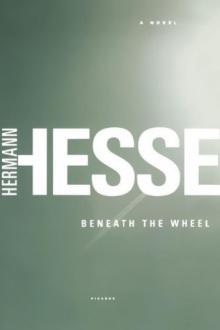 Beneath the Wheel
Beneath the Wheel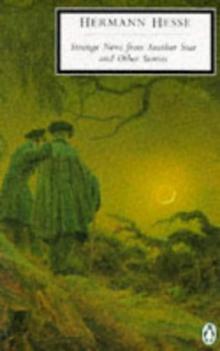 Strange News From Another Star
Strange News From Another Star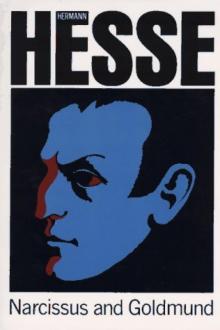 Narcissus and Goldmund
Narcissus and Goldmund Steppenwolf
Steppenwolf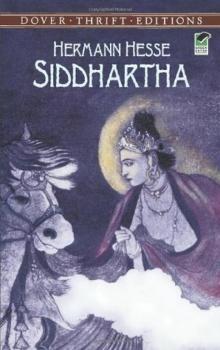 Siddhartha
Siddhartha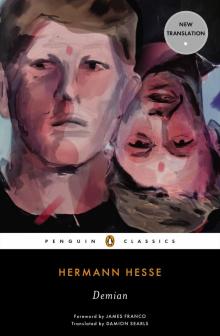 Demian
Demian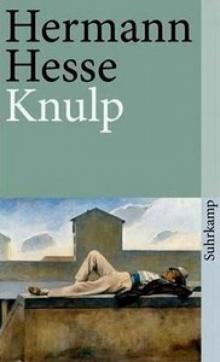 Knulp
Knulp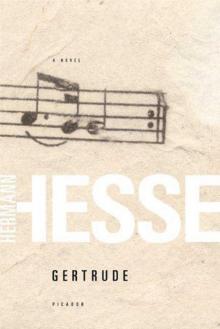 Gertrude
Gertrude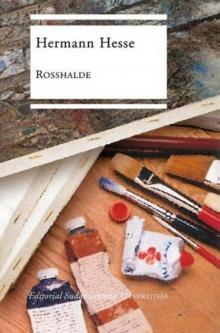 Rosshalde
Rosshalde The Glass Bead Game
The Glass Bead Game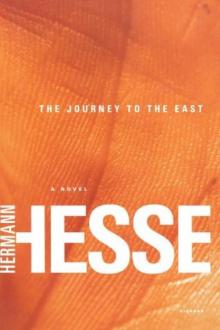 The Journey to the East
The Journey to the East Klingsor's Last Summer
Klingsor's Last Summer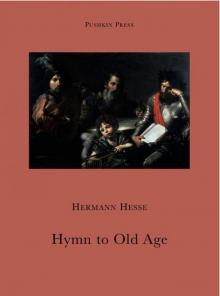 Hymn to Old Age
Hymn to Old Age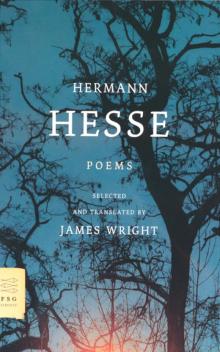 Poems
Poems The Fairy Tales of Hermann Hesse
The Fairy Tales of Hermann Hesse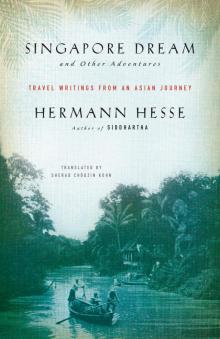 Singapore Dream and Other Adventures
Singapore Dream and Other Adventures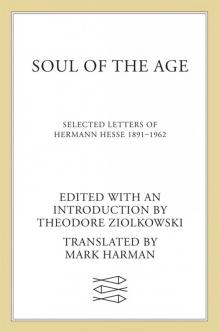 Soul of the Age
Soul of the Age